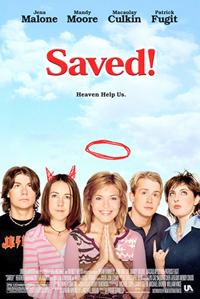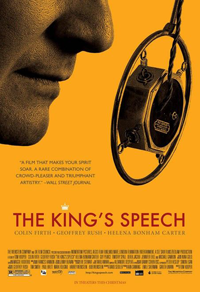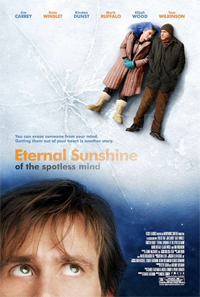(Originally published in Gapers Block on June 11, 2004, I decided to add this to the Deleted Scenes archives because of Moore’s recent film, Tangled. The film is now available on video and On Demand through Amazon, as well as on video through Netflix.)






Directed by Brian Dannelly.
Starring Jena Malone, Mandy Moore, Macaulay Culkin, Patrick Fugit, Heather Matarazzo, Eva Amurri, Martin Donovan and Mary-Louise Parker.
The unholy suckiness that Christian rock generally traffics in is entirely too easy to make fun of, so it’s refreshing that Saved! takes the high road and allows its soundtrack to be kind of good. Besides some seemingly authentic (but most likely not) Christian rock, it features a few secular songs with the G- or J-words in them, such as Santana’s “Jesus Is Just Alright†and, believe it or not, the Beach Boys’ “God Only Knows†covered by Mandy Moore and Michael Stipe, who also served as producer. Similarly, the amount of sincerity and respect with which co-writer and director Brian Dannelly treats not only the film’s soundtrack, but also its genre, its characters and its intended audience is also refreshing — so much so that the fact that Saved! is a damned funny movie seems almost like a bonus.
In Saved!, an American Eagle Christian High School student named Mary (Jena Malone) who gets impregnated by her gay boyfriend (Chad Faust) and then proceeds to hide it from her friends and family over the course of the school year. The story occasionally wanders away from Mary and her pregnancy to concentrate on her mother’s flirtation with married-but-separated Pastor Skip (Martin Donovan) and wheelchair-bound Roland’s (Macaulay Culkin) blossoming relationship with the school’s Jewish hellion (Eva Amurri), as well as throw-away bits like Mary and her mother Lillian (Mary-Louise Parker) seeing a TV promo for a cancer movie starring Valerie Bertinelli (as herself) on Lifetime. (Mary-Louise Parker’s “Oh, that looks good†is hilariously sincere.) Somewhere in there, the filmmakers manage to squeeze in Patrick Fugit (Almost Famous), who provides a likeable enough romantic interest as a straight boy (Pastor Skip’s son, naturally) who Mary becomes interested in through the course of the school year, despite the obvious weirdness. The various threads all come together on prom night, of course, because this is still a high school movie after all; that’s how it’s supposed to happen.
Saved! never seriously questions faith itself any more than your typical episode of 7th Heaven, and it’s simply misguided to expect it to — you don’t walk into a Christian bookstore and look for Bertrand Russell’s Why I Am Not a Christian. Decidedly more on the level of, say, Mean Girls (minus the PG-13 T&A) than Election as high school satires go, Saved! is a surprisingly intelligent and even occasionally subtle movie that is, in every respect except for its Christian school setting, a by-the-numbers teen comedy: relatively flat characters, derivative plot and all. But I don’t mean that in a bad way; in this case, the flatness of the characters and predictable plot, help in some ways to underscore the film’s general message, which is clearly targeted much more towards believers than non-believers. Saved! is a terrific example of how the use of stereotypical characters and stock plots can be effectively handled (at least when the stereotypes used are at least somewhat rooted in reality, and from my own experiences being a part of a Christian youth group in my early teens, Saved!’s “Jesus freak†characters are definitely not wholly fiction; in fact, I would say the self-righteousness and condescension depicted in Saved! is a little mild compared to the beliefs of most evangelical Christians). The characters’ Christianity is occasionally played for laughs (yes, there is a “missionary position†joke in the movie) but their Christianity itself is never the butt of a joke, even though some specific few of their more misguided beliefs are fair game, most prominently their attitudes towards other religions (“heathensâ€) and homosexuality (“faggotryâ€).
The film has been chastized by some critics for making fun of its Christian characters, and by other critics for not making fun of them enough; both of these viewpoints are way off-base, because although hardcore Bible thumpers won’t agree with me, Saved! is, at its heart, a Christian film. What Saved! isn’t, though, is a fundamentalist Christian film. It recognizes, as Brian Dannelly stated in a recent interview with the Seattle Post Intelligencer, that “evangelical conservatives [have] hijacked the term ‘Christian,’†and that there are some fundamental flaws in their ideas of Christ and of Christianity (not to mention the world around them). But despite the movie-butter-induced visions that other reviewers have had that lead them to believe otherwise, Saved! absolutely does not pass judgment on its characters nor does it hold them up for ridicule the way some close-minded believers have said (and some close-minded non-believers would prefer). It only recognizes that they have a little room for improvement. Every character, even the movie’s closest thing to a villain, Hilary Faye, is implicitly forgiven and redeemed at the end, because that’s what Christianity is all about, not cynicism or hate — at its roots, true Christianity, on a personal level, is just about becoming a better person.
Saved! is playing at Pipers Alley, River East 21 and the Century 12/CineArts 6 in Evanston. Incidentally, Michael O’Sullivan’s review of Saved! for the Washington Post is quite possibly the most ridiculous review I’ve read of this film.



 Eternal Sunshine of the Spotless Mind
Eternal Sunshine of the Spotless Mind